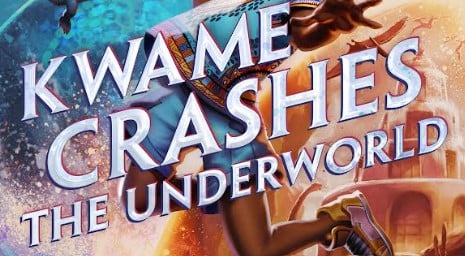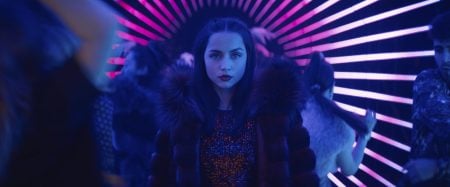GVN: Hello Craig! Thank you so much for speaking with Geek Vibes Nation about your upcoming novel, Kwame Crashes The Underworld. Could you start by telling our audience about yourself and your book?
Of course! My name is Craig Kofi Farmer, and I grew up in Prince George’s County, MD. I currently work in higher education, trying to give students the tools they need to succeed in their collegiate environment. I also love to write stories, specifically fantasy stories that explore a fundamental truth about humanity (culture, emotions, relationships, etc.). In my spare time, I inhale superhero media, psychological thrillers, and just food in general.
KWAME CRASHES THE UNDERWORLD is about Kwame Powell, a twelve-year-old kid from North Carolina who refuses to admit that he’s grieving the loss of his grandmother. He’s definitely not looking forward to going all the way to Ghana to attend his grandmother’s celebration of life. He doesn’t want to confront how he’s truly feeling, nor does he want to be around all his Ghanaian relatives who make him feel like some lame American. But when he falls into Asamando, the Ghanaian underworld, Kwame finds himself in the middle of a divine odyssey that includes a dead Mother Earth, a pantheon of angry gods, and the ancestral spirit of his grandmother…who somehow looks like a kid in this world. Kwame must work with his best friend Autumn to find a way to accept his grief—and his identity—so he can save the world and escape Asamando.
GVN: The novel is a winning combination of middle-grade adventure and Ghanaian mythology. What was its genesis?
My mother was a reading specialist when I was younger, so I remember reading countless books growing up. Some were imaginative, some were speculative, and some were educational; but I remember being especially partial towards the Percy Jackson novels. Those books were fun, snappy, and accessible. They managed to teach the reader not just about Greek mythology, but also about the importance of responsibility and belonging. Those books were also being published around the time that my grandmother passed away (sound familiar?), which might be part of the reason why they hold such a special place in my heart. With this said, I remember loving those book characters so much that I wanted to look like them—even though they did not look like me. This was when I learned about the power of representation in storytelling.
As I grew up, I continued to engage with media that satiated my hunger for fantasy/fictional adventures. I loved stories like Avatar: The Last Airbender, The Incredibles, and Spider-Man: Into the Spider-Verse. Each time I walked away from one of those thrilling stories, my mind would take me on a journey of creation; how would I have written the story? What would I have done if those were my characters? How would I have approached the antagonist? My creativity was piqued by these stories, and I couldn’t get enough.
You may remember the headlines when this happened, but Chadwick Boseman passed away in 2020. For those that don’t know, Boseman was a creative force on screen; his movie roles were Black characters navigating nuanced stories and sending powerful messages. The worldwide celebration of Boseman’s legacy reminded me of all that my grandmother did—not just for her family, but for her village in Ghana. She was a Queen Mother in her community, one of the leaders that people looked up to and felt represented by.
From there, I started thinking about how I could honor my family’s legacy. I decided to use the thing I loved—storytelling—and craft something that would honor my grandmother, my Ghanaian culture, my Black identity, and all the stories I fell in love with growing up. KWAME CRASHES THE UNDERWORLD is a story that’s not only accessible to audiences, but also explores family, culture, and grief. The story has the characters and representation that I wished I had when I was growing up. The story has action and powers that me and my brother would’ve loved when we were in middle school. The heavier concepts like grief and culture are communicated amid a backdrop of colorful Ghanaian mythology. I hope that, like some of my favorite stories, this book will be a fun adventure that helps readers feel more seen and empowered to navigate this world.
GVN: Kwame is a young protagonist who deals with a lot during the novel. He’s dealing with bullying from classmates and the recent passing of his grandmother. What went into creating a great lead character but giving him such heavy issues?
Every lead character should be a person! And people are complicated—especially kids. Kids have no shortage of worries, fears, insecurities, enthusiasm, and imagination. I wanted to capture all that nuance in Kwame. Yes, Kwame is grieving the loss of his grandmother. Yes, he’s feeling disconnected from his culture. But he’s also a best friend to Autumn. He’s a huge video game and movie fan. He’s a pizza enthusiast. He’s horrible at basketball. And he’s also been taught to suppress his emotions all his life, as a survival mechanism.
I wanted to create a character that felt real and three-dimensional. I wanted to show that having struggles doesn’t make you weird or lame—it makes you human. On the flipside, even if you’re stressed out or trapped in a life-or-death scenario with a Ghanaian god, you may find a moment to laugh at something funny. The human spirit is a mosaic, and I think storytelling can help bring out all the colors and shapes of that mosaic.
GVN: You did a great job of balancing mythology and adventure with the story’s heavy themes. Was that balance always there, or was it perfected in rewrites?
Thank you so much! I’m very grateful for not only my agent and editors (shout out to Emilia and the Emily’s), but also Ghanaian mythology as a whole. Ghanaian mythology is so rich, nuanced, and lush that it was a natural bridge to the book’s themes of grief, culture, environmentalism, and emotion. For example, in the lore, Asase Yaa is the Ghanaian goddess of the Earth and the mother of Anansi and Tano. Once I decided to bring a Mother Earth figure into this story, I asked myself how Mother Earth would feel about everything going on in the world today. How does climate change affect Mother Earth? Does she get sick? What happens if she passes away? What happens when Anansi and Tano find out that their mother died and blame humans for destroying the world? All this background and worldbuilding stemmed from those initial myths of Asase Yaa and her divine family.
Again, I must give a huge thank you to Emily Forney, Emilia Sowersby, and Emily Feinberg for helping me figure out how best to balance the loud fantasy aspects of the story with the quieter personal elements. We worked hard to hone the manuscript so that every scene works towards one of the many goals of this story. It’s not easy to balance a journey of self-exploration with a fast-paced fantasy adventure. But when you’re working with such wonderful people, it’s about as easy as it gets.
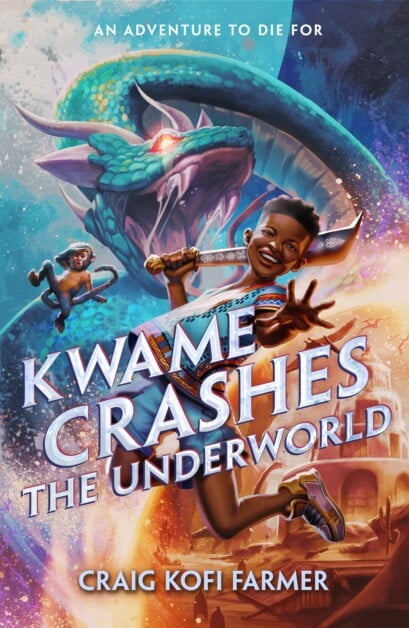
GVN: The novel has such great supporting characters, like Kwame’s friend Autumn. What do you find to be the key to creating a great supporting cast?
It makes my heart happy to see people giving Autumn the recognition she deserves. Generally, people navigate life through their own lens/perspective. I tried to take that approach to character-building in this story; each supporting character should be the main character of their own untold story. If we think about this through the paradigm of video games, each character should have their personal backstory, fighting style, catchphrases, and special moves. Some readers might gravitate towards certain characters over others, but a variation of personalities helps make a world feel more vibrant and lived in.
GVN: Autumn is hard of hearing, and she and Kwame communicate using sign language. What went into the decision to include that aspect in the story?
I had some close friends in college who were in the hard-of-hearing and Deaf communities. I quickly learned that this world often fails to make life accessible for these groups. I promised myself that if I was fortunate enough to bring a book into the world, I would make one of my main characters hard-of-hearing or Deaf to honor those communities.
In Kwame and Autumn’s relationship, Kwame chose to learn ASL because there were times when that was the best way to communicate with his best friend. I didn’t want to portray this gesture as overly “kind” or “generous,” because it was the bare minimum in their friendship. Kwame and Autumn are so close that either one of them would immediately go out of their way to make the other person as comfortable as possible.
There’s a beauty to ASL, and I think more people should at least know the basics. This story includes some conversations in ASL, and I hope readers can pick up some basic signs just by reading. If literature represents our world, then it should represent all of us—including identities that aren’t often spotlighted in stories. I’m very grateful to the people from the hard-of-hearing and Deaf communities who entered this creative process and helped make sure that the character of Autumn felt authentic and natural. I hope that readers will connect with Autumn as much as I did.
GVN: Did you face any challenges while writing the novel? If so, how did you overcome them?
The biggest challenge for me was trying to figure out what items to keep and what items to cut. It’s a blessing every time someone picks up my story and opens their heart to these characters. As such, I want to make sure that the text they’re reading is both entertaining and efficient. Even though I wanted to go big with all the Ghanaian mythology references, there were times when I had to reel back on the extra inclusions and focus on the narrative at hand. To overcome this challenge, I just thought back to what I wanted to accomplish with this story in the first place—which was accessibility, representation, and entertainment.
GVN: What was your favorite part of writing the book? Do you have a favorite scene or favorite character?
This is a great question! It was wonderful to be able to write a book that takes place in an original world. I loved being able to craft my own ecosystem, characters, plot points, and current events. Part of the fun of writing your own world is threading your voice, humor, and perspective into the DNA of the story.
For example, some of my favorite scenes are when Kwame or Autumn call out some story tropes or clichés as they happen. Kwame and Autumn are both geeks, so they’re huge fans of science fiction, anime, and superhero media. When they’re thrown into a fantasy adventure, they’re bound to encounter some story beats that seem quite familiar. The jokes that Kwame and Autumn crack about those tropes still make me laugh to this day (even though I wrote the jokes), and it makes me happy to see other readers connecting with the humor.
Additionally, I got to hammer out my first divinity system in this story. It was a great cognitive exercise for me to contemplate how gods exist in this world. What makes them gods? Where do they get their power? What is the hierarchy? What does a family look like when the members are all immortal, powerful gods? What’s their relationship with humans? And how do I answer these questions while still keeping the story approachable to readers—especially when that approachability is what made me fall in love with reading in the first place?
GVN: Were there any bits of Ghanaian lore that ended up on the cutting room floor of this first installment?
This is another amazing question. There was so much Ghanaian lore that was not included in this story. I wish that I had the space to shine some more light on characters like Bia or the Sasabonsam; but if readers are paying attention, they can see some easter eggs that refer to both these characters. Ghanaian mythology is so vast and colorful that someone would need several books to reference everything. We just don’t have that kind of time.
GVN: What is the main message you’d like young readers to walk away with?
I’d just like readers to feel seen. I want them to feel comfortable in their skin, whether that means loving their body, accepting their culture, embracing their emotions, or feeling empowered to do some good in this world.
GNV: Any advice to aspiring writers?
I could say something straightforward like, “Practice writing,” or “Write a little bit every day,” but I would just say: find your inspiration. For me, my inspiration was everything from Percy Jackson to superheroes to speculative science fiction. Other people may feel inspired by friends, music, movies, nature, or history. If you identify as a writer, find that thing that sparks your creativity and use that to write the story of your heart. Chances are, if you want to see a certain story—someone else does too.
KWAME was not the first book I wrote. KWAME happened to be the first story that got to the point of being introduced to the world. I would advise writers against tying their creative worth to whether their story gets published (easier said than done). Don’t invalidate your creativity just because one of your ideas might not neatly fit into the literary zeitgeist. Stay true to yourself and keep telling stories.
GNV: Can you tell us what you’re working on next?
Hmm. I can say that there’s something else in the works. As I mentioned earlier, I love creating stories that explore those fundamental experiences of humanity—and wrapping it in a genre that I love. I imagine that the next story, whatever form that may take, will continue that trend.
More information about my next project will be coming soon—stay tuned!
GVN: Where can our readers connect with you online?
Yikes. I’m really bad with social media, but readers can find me on Twitter at @State_Farmm (it’s a reference to what the kids in high school used to call me). You can also find more about KWAME on Macmillan’s website.
Kwame Crashes The Underworld goes on sale everywhere books are sold September 10th.
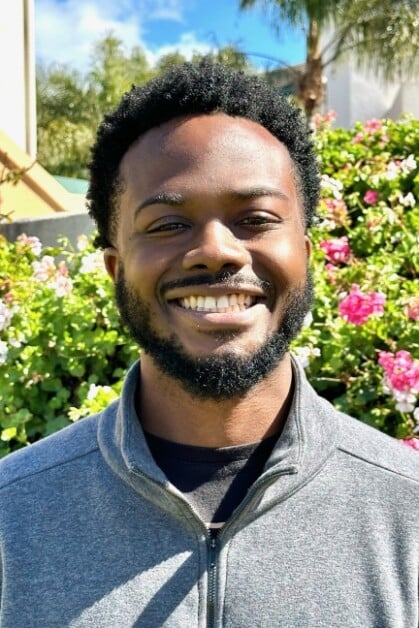
Author Bio
Craig Kofi Farmer is a Prince George’s County native, with two Bachelor of Science degrees from Towson University and one Master of Education degree from the University of Maryland, College Park. He works in higher education administration, helping students achieve work-life balance and self-actualization. When he’s not writing, he’s analyzing superhero movies, watching psychological thrillers, and deciding exactly what he’s going to eat that day.
About The Book
Discover a stunning middle grade fantasy about a boy hurled into the Ghanaian underworld to help his grandmother save humanity, perfect for fans of Tristan Strong and Amari and the Night Brothers.
Twelve-year-old Kwame Powell isn’t ready to deal with losing his grandmother, even as he and his family head to Ghana for her celebration of life.
He’s definitely not ready when he’s sucked into a magical whirlpool that leads straight to Asamando, the Ghanaian underworld. There, he comes face to face with his grandmother, who is very much alive, and somehow still…a kid? Together with his best friend, Autumn, and a talkative aboatia named Woo, Kwame must battle angry nature gods, and stop the underworld from destroying the land of the living.
But there’s an even bigger problem: Only living souls can leave Asamando. In order to save the mortal world and return home, Kwame will need to find the courage to do the bravest thing of all — learn how to say goodbye.
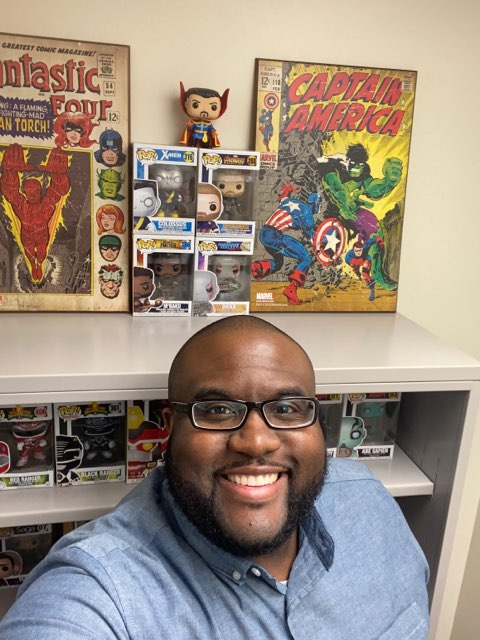
Writer. Video Essayist. Film/TV Critic. Pop Culture Enthusiast.
When he isn’t writing for Geek Vibes Nation or The Cinema Spot, Tristian can be found typing away at one of the novels or screenplays he’s been working on forever.


